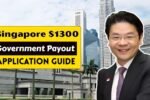Follow Us on WhatsApp
Get the latest updates directly on WhatsApp – motivation, news & more!
Singapore has long been one of the most preferred destinations for foreign workers due to its strong economy, advanced infrastructure, and career opportunities. The government regularly reviews and updates its work permit rules to ensure a balanced job market that benefits both locals and foreigners. In 2025, new updates have been introduced to the work permit framework, bringing significant changes in eligibility, application process, and compliance requirements. Understanding these updates is crucial for anyone planning to work in Singapore.
Overview of the 2025 Work Permit Updates
The Ministry of Manpower (MOM) has rolled out several policy adjustments in 2025 to streamline the hiring of foreign workers while safeguarding local employment opportunities. The focus is on sectors that rely heavily on foreign labor such as construction, marine shipyard, manufacturing, and services. These updates aim to maintain economic growth while preventing over-dependence on migrant workers.
Key highlights of the new updates include revised eligibility criteria, stricter quota requirements for employers, enhanced medical and housing standards, and a more transparent application process through digital platforms.
Eligibility Criteria for Foreign Workers
To apply for a Singapore Work Permit in 2025, applicants must meet certain eligibility requirements set by the MOM. These conditions vary depending on the sector but generally include.
- Minimum age requirement of 18 years and not exceeding 50 years for most industries.
- Workers must be from MOM-approved source countries.
- Valid passport and health clearance certificates.
- Applicants should not have records of overstaying or previous work permit violations in Singapore.
- In some sectors, specific skill certifications or training requirements are mandatory.
Employers are responsible for ensuring that their foreign employees meet these conditions before applying for a permit.
Sector-Specific Quota and Levy Changes
One of the major updates in 2025 involves the quota system and foreign worker levies. Employers must comply with a Dependency Ratio Ceiling (DRC), which limits the proportion of foreign workers they can hire compared to local employees.
- In the manufacturing sector, the quota has been tightened slightly to encourage more hiring of local workers.
- The services sector faces stricter levy requirements to reduce reliance on low-skilled migrant labor.
- Construction and marine shipyard sectors still have relatively higher quotas, given the labor-intensive nature of work, but levy rates have been adjusted to control costs.
These changes are designed to create a balanced workforce and encourage employers to prioritize local talent while still allowing necessary foreign recruitment.
Application Process in 2025
The Singapore Work Permit application process has become more transparent and technology-driven in 2025. Employers must follow these steps:
- Submit Application Online – Applications are filed through the MOM’s digital portal with required documents such as worker’s passport details, health test results, and employment contracts.
- Approval in Principle (AIP) – Once the application is assessed, the MOM issues an Approval in Principle, which allows the worker to enter Singapore.
- Medical Examination – Workers must undergo a medical check-up upon arrival to confirm fitness for employment.
- Issuance of Work Permit – After medical clearance, the work permit card is issued and linked digitally for verification.
Employers are also required to provide proper housing facilities and ensure their workers are enrolled in mandatory insurance schemes.
Medical, Insurance, and Housing Requirements
The 2025 updates emphasize better living and working conditions for foreign workers. Employers must provide:
- Comprehensive medical insurance covering inpatient and outpatient treatments.
- Safe and hygienic accommodation that meets government-approved standards.
- Regular health screenings for workers in high-risk industries.
These rules are aimed at safeguarding the welfare of foreign workers and reducing disputes related to poor living conditions.
Renewal and Cancellation of Work Permits
Work permits are typically valid for up to two years, depending on the contract and sector. In 2025, renewal requirements have been tightened to ensure compliance. Employers must prove continued need for the worker, payment of levies, and proper housing arrangements before renewal is granted.
If a worker changes employer or breaches permit conditions, the work permit may be canceled. In such cases, the worker must leave Singapore immediately unless granted special permission to transfer to another approved employer.
Penalties for Non-Compliance
The MOM has increased penalties in 2025 for employers and workers who violate work permit rules. Employers who hire workers illegally, exceed quotas, or fail to provide proper housing may face heavy fines and debarment from hiring foreign workers in the future. Workers who overstay or work without a valid permit risk immediate deportation and long-term bans from re-entry.
Importance of the Updates for Workers and Employers
These updates reflect Singapore’s long-term strategy of balancing economic growth with local employment protection. For workers, the new rules ensure better job security, fair wages, and safer living conditions. For employers, stricter rules may increase compliance costs, but they also encourage more efficient workforce planning and reduce labor disputes.
Final Thoughts
The Singapore Work Permit 2025 updates bring a fresh wave of changes that impact both foreign workers and employers. With stricter eligibility rules, updated quotas, enhanced housing and medical requirements, and a digitalized application system, the new framework ensures fairness, transparency, and sustainability in the labor market. Anyone planning to work in Singapore or hire foreign employees must stay updated with these changes to avoid penalties and ensure smooth employment practices.




